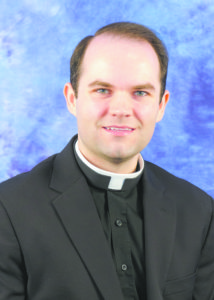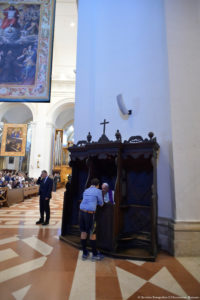
Aaron Williams
Spirit and Truth
By Deacon Aaron M. Williams
“Jesus said to [the Samaritan woman], ‘The hour is coming, and now is, when true worshippers will worship the Father in spirit and in truth, for such the Father seeks to worship him’” (John 4:23). During my diaconate internship in Meridian this past year, I taught a course on the sacred liturgy entitled “Spirit and Truth” — taken from this passage of the Gospel of John, which incidentally was the gospel at my diaconate ordination. In this passage, our Lord meets the Samaritan woman and enters a dialogue with her which causes her to realize that he is the Messiah. One of the questions she poses to the Lord involves a matter of the law of worship. Whereas the Jews worshiped in Jerusalem, the Samaritans worshipped in their own district (and therefore were seen as outcasts by the Jews). Christ reveals that in the new covenant, it will not matter if God is worshipped in a particular city, but that he be worshiped in a particular way — in “spirit and truth”.
Now, when we hear these words, we can mistakenly interpret them to mean that the worship Christ desires is some sort of non-physical reality. That is what “spiritual” means, after all. But, the Lord himself explains these terms in the next verse. He says, “God is spirit and those who worship him must worship in spirit and truth” (vs 24). In the Jewish mind, to do something “spiritual” was to do something that only God was capable of doing. Every day rituals and animal sacrifice were offered in the temple in Jerusalem, but these were “human” acts — they were done by men at the command of God. But, even in the Jewish mind, these acts could not have truly pleased God, but only functioned to give thanks or make atonement for personal blessings and sins. The promise of Christ to the Samaritan woman is that somehow men and women will perform “spiritual” worship. In other words, somehow they themselves will do something that only God can do — the only sort of worship that could please truly God.
And not only that, but this worship will be done in “truth.” It will be authentic, lawful, and in accordance with He who is Truth, which we know to be Jesus Christ. Thus, Our Lord is promising the Samaritan woman that the worship offered by the people of the New Covenant, though not offered in the temple in Jerusalem, will be even greater because it will be enabled by God and be truly perfect.
This is a great promise to all of us, of the great dignity we have, by offering God our the worship of the Church — the Sacred Liturgy, which his the fulfillment of Christ’s promise in the fourth chapter of the Gospel of John. The Church is able to offer this spiritual worship by virtue of our Baptism, whereby all of us are conformed to Christ and enabled by Christ to participate in his mystical worship of the Father. Therefore, unlike the people of the Old Covenant, our worship, when done as part of the Church — which is the Mystical Body of Christ — can truly please God, because it is not the actions of men or women, but of Christ. In the Sacred Liturgy, we are made participants in Christ’s perfect worship of the Father.
Regrettably, even in light of the astounding generosity of our Lord, who grants us such a great dignity by share in this ‘gift of God’ (cf. John 4:10), many people within the Church miss the point of Christ’s promise and instead focus on the same questions of the Samaritan woman. “Should we worship in Jerusalem or Samaria?” “Should we do this practice or ought this custom be forbidden?”
The Sacred Liturgy, which ought to be the most unifying aspect of the Christian life, is often a source of division in the Church. This is mainly because some people, intending to do what is right, begin to forget that the liturgy — the worship of God — does not belong to them, but to the Church and primarily to Christ. We are participants in his action. And, though there is room for our own humanity to shine through by the various customs we observe in the liturgy, it would be a terrible error if we allowed that personal expression to overshadow the unifying and ultimate action of Jesus Christ in the liturgy.
It is for that reason that I decided to start this column. I am confident that the controversy and division present in the Church regarding the liturgy cannot be solved either by providing a list of rules or a encouraging a spirit of individualism. Rather, by seeking to come to knowledge of what the liturgy is intending to do, and who is acting, we can be far more equipped to address the matter of how this action is meant to be done.
(Deacon Aaron Williams and his classmate, Deacon Nicholas Adam, are completing their final semester of seminary formation before their priestly ordinations on May 31, 2018 see page 11 for details.)



 Guest Column
Guest Column

